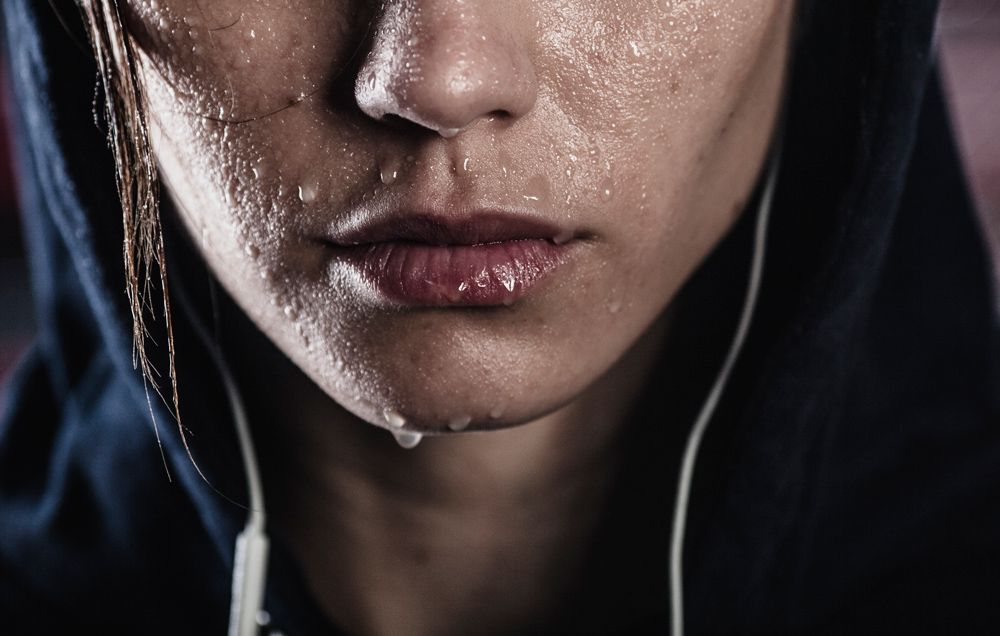Sweating on face, like sweating in other parts of the body, is a normal physiological response to help regulate body temperature. However, excessive sweating on the face, known as facial hyperhidrosis, can be caused by several factors. Several factors can contribute to sweating on the face, including heat and humidity, anxiety and stress, physical activity, spicy foods, hormonal changes, certain medical conditions, medications, and genetics.
Scroll till the end to find out the causes, home remedies, treatment and tips to control sweating on face.
Causes Of Sweating On Face
Here are some common causes:
1. Heat and humidity:
Exposure to high temperatures and humid environments can cause increased sweating on the face and other parts of the body.
2. Anxiety and stress:
Emotional factors such as anxiety, stress, or nervousness can trigger sweating on the face. This is because the sympathetic nervous system, which controls the “fight-or-flight” response, can stimulate sweat glands.
3. Physical activity:
Engaging in physical exercise or activities that raise your heart rate and body temperature can lead to sweating on the face.
4. Spicy foods:
Consuming spicy foods or hot beverages can cause temporary sweating on the face due to the release of certain chemicals that can stimulate sweat glands.
5. Hormonal changes:
Hormonal fluctuations, particularly during puberty, menopause, or as a result of hormonal imbalances, can lead to increased sweating on the face.
6. Certain medical conditions:
Certain medical conditions, such as hyperthyroidism, diabetes, cardiovascular diseases, and infections, may cause excessive sweating on the face as a symptom.
7. Medications:
Some medications, including certain antidepressants, antipyretics, and drugs that affect blood pressure, can cause excessive sweating as a side effect.
8. Genetics:
Some individuals may have a genetic predisposition to excessive sweating on the face, which is known as primary focal hyperhidrosis.
If you are concerned about excessive sweating on your face or if it significantly affects your daily life, it is recommended to consult a healthcare professional for a proper evaluation and guidance. They can help determine the underlying cause and provide appropriate treatment options.
How To Control Sweating On Face
It’s essential to find the underlying cause of your excessive facial sweating to determine the most effective treatment.

Here are some suggestions that may help:
Keep your face clean:
Wash your face with a gentle cleanser regularly to remove excess oil, dirt, and sweat that can contribute to sweating. Avoid harsh cleansers that may irritate the skin and cause more sweating.
Use antiperspirant or facial wipes:
Apply antiperspirant products specifically designed for the face. These products contain ingredients that help reduce sweat production. Alternatively, you can use facial wipes or blotting papers to absorb excess sweat throughout the day.
Choose breathable fabrics:
Opt for lightweight and breathable fabrics, such as cotton, linen, or moisture-wicking materials, which allow better airflow and help keep your face cool.
Use a mattifying primer or powder:
Applying a mattifying primer or a powder specifically designed for oily skin can help absorb excess oil and reduce shine on your face, which can be associated with sweating.
Avoid triggers:
Identify and avoid triggers that make you sweat more, such as spicy foods, hot beverages, and stressful situations. Limit your exposure to hot and humid environments when possible.
Stay hydrated:
Drink plenty of water to keep your body temperature regulated. Staying hydrated can help reduce excessive sweating.
Manage stress:
Practice stress management techniques like deep breathing exercises, meditation, or engaging in activities you enjoy. Stress can trigger sweating, so finding ways to relax can help reduce facial sweating.
Consult a healthcare professional:
If excessive facial sweating is causing significant distress or impacting your quality of life, consider consulting a dermatologist or healthcare professional. They can provide additional treatment options such as prescription antiperspirants, medications, or medical procedures like Botox injections or laser treatments.
Home Remedies To Stop Sweating On Face
While home remedies may not completely eliminate excessive sweating on the face, they can help manage the condition to some extent.
Here are some home remedies you can try:
Witch hazel For Sweating:
Witch hazel is a natural astringent that can help tighten the skin and reduce sweating. Apply witch hazel to your face using a cotton ball or pad.
Apple cider vinegar:
Dilute apple cider vinegar with water and apply it to your face using a cotton ball. It can help balance the pH level of the skin and minimize sweating.
Green tea For Sweating:
Brew a cup of green tea, allow it to cool, and then apply it to your face using a cotton ball. Green tea contains tannic acid, which can help control sweating.
Tomato juice For Sweating:
Apply fresh tomato juice to your face and leave it on for 15-20 minutes before rinsing it off. Tomatoes have astringent properties that can help reduce sweating.
Sandalwood powder:
Mix sandalwood powder with rose water to form a paste and apply it to your face. Leave it on until it dries, then rinse it off. Sandalwood has a cooling effect and can help control excessive sweating.
Baking soda For Sweating:
Mix baking soda with water to create a paste and apply it to your face. Baking soda acts as a natural absorbent and can help absorb excess sweat.
Sage tea:
Brew sage tea by steeping sage leaves in hot water, then allow it to cool. Apply the tea to your face using a cotton ball. Sage contains compounds that can help reduce sweating.
Aloe vera For Sweating:
Apply fresh aloe vera gel to your face and leave it on for 15-20 minutes before rinsing it off. Aloe vera has soothing properties and can help control sweating.
Tips To Reduce Excessive Sweating On Face
To help control sweating on the face, you can try the following tips and precautions:
Use a gentle cleanser:
Cleanse your face with a mild, pH-balanced cleanser to remove excess oil, dirt, and sweat that can contribute to sweating.
Homemade cleanser for daily use
Avoid harsh skincare products:
Harsh cleansers, exfoliators, and skincare products can irritate the skin and potentially trigger more sweating. Opt for gentle, non-irritating products instead.
Use antiperspirant or facial wipes:
Apply antiperspirant products specifically designed for the face. These products contain ingredients that help reduce sweat production. Alternatively, you can use facial wipes or blotting papers to absorb excess sweat throughout the day.
Opt for breathable fabrics:
Choose lightweight and breathable fabrics for your clothing and headwear, such as cotton or moisture-wicking materials. These fabrics allow better airflow and help keep your face cool.
Keep a clean towel or tissue handy:
Carry a clean towel or tissue with you to gently blot away sweat from your face when needed. Avoid rubbing or wiping vigorously, as it can irritate the skin.
Avoid spicy foods and hot beverages:
Spicy foods and hot beverages can increase body temperature and trigger sweating. Limit your consumption of such items, especially if you notice they contribute to facial sweating.
Stay hydrated:
Drink plenty of water to maintain proper hydration. Staying hydrated can help regulate body temperature and potentially reduce sweating.
Manage stress:
Stress can contribute to excessive sweating. Practice stress management techniques such as deep breathing exercises, meditation, or engaging in activities you enjoy to help control stress levels.
Avoid hot and humid environments:
Try to limit your exposure to hot and humid environments as much as possible, as they can exacerbate sweating. Seek cooler and well-ventilated spaces when necessary.
Consult a healthcare professional:
If excessive facial sweating persists or significantly affects your quality of life, consider consulting a dermatologist or healthcare professional. They can provide further guidance, evaluate underlying causes, and suggest appropriate treatment options.
Conclusion
Sweating on the face is a natural response that helps regulate body temperature. Excessive facial sweating, known as facial hyperhidrosis, can be caused by various factors. While home remedies and precautions can help manage facial sweating to some extent, it is advisable to seek professional guidance if the issue persists or significantly impacts daily life.




